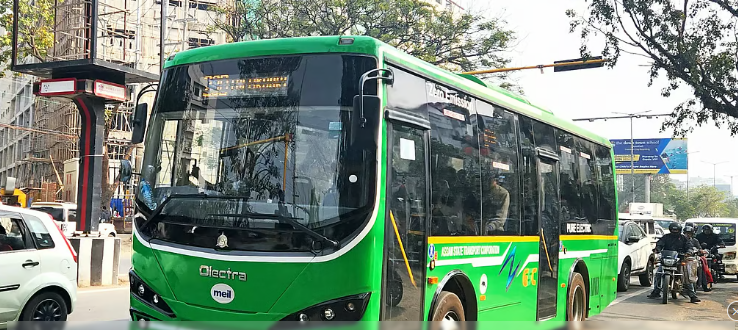As summer temperatures continue to soar in Assam’s capital city, commuters in Guwahati are increasingly turning to the recently introduced green buses for daily travel.

As summer temperatures continue to soar in Assam’s capital city, commuters in Guwahati are increasingly turning to the recently introduced green buses for daily travel. Over the past two years, these eco-friendly vehicles—comprising electric and CNG models—have emerged as a game-changer in the city’s public transportation network, offering commuters a safer, more comfortable alternative to traditional city buses.
Managed by the Assam State Transport Corporation (ASTC), the green buses are equipped with modern amenities such as air conditioning, CCTV surveillance, and accessibility features for differently-abled passengers. These additions have not only enhanced passenger comfort during the scorching summer months but also elevated the overall perception of public transport in the city.
“The air-conditioned interiors make a huge difference during the summer. It’s also reassuring to know there are CCTV cameras inside, especially for women traveling alone,” said a regular commuter who travels daily from Beltola to Paltan Bazar. Similar sentiments were echoed by many passengers who have shifted to green buses as their primary mode of transport.
The shift towards sustainable transit began in earnest in 2023 when the state government introduced 200 electric and 100 CNG buses under a broader initiative to modernize Guwahati’s public transport and reduce the city’s carbon footprint. The move aligns with the state’s push for cleaner energy solutions and inclusive urban development. On January 1 this year, an additional 56 electric buses were added to the fleet, further expanding the network’s capacity.
At present, Guwahati’s public transport fleet includes approximately 352 privately-owned conventional buses, alongside 256 electric and 100 CNG buses operated by ASTC. However, officials have acknowledged that not all buses run daily, with operational schedules varying based on demand and availability.
Despite the overwhelming positive reception, the rollout has not been without its challenges. Some commuters have expressed concerns regarding service gaps on key routes. “There’s a need for more frequent service on RG Baruah Road, especially during peak hours. It’s a vital connector between MRD Road and GS Road,” said one passenger. Others have flagged instances of rash driving, urging the transport department to provide additional training for drivers to ensure passenger safety.
Responding to these concerns, a senior transport department official confirmed that steps are being taken to address service and safety issues.
Article Credit: sentinelassam